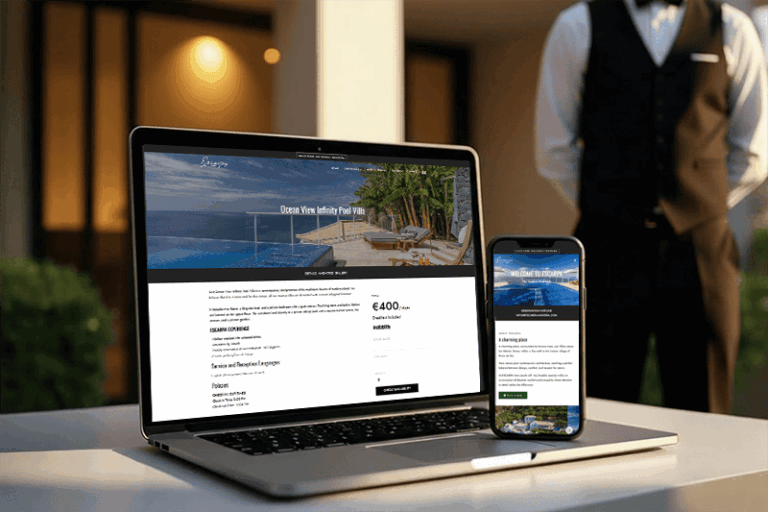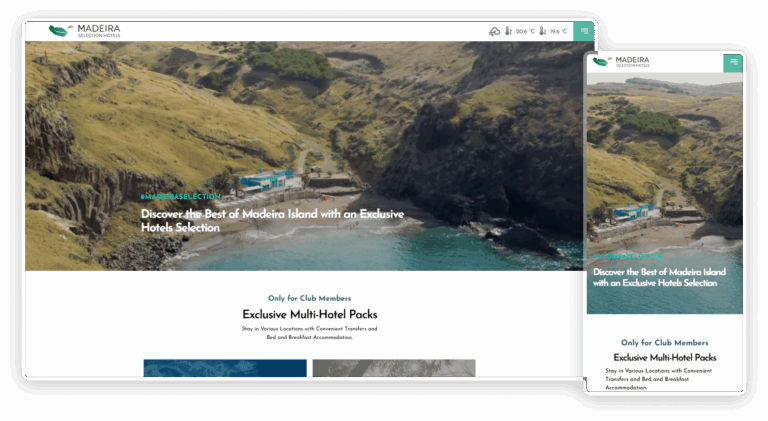Hotel websites

The hotel industry has always been about the details. Creating experiences that stick with travelers long after they check out. The best brands get this. They curate unique stays, offer flexibility across different locations, and give guests real reasons to explore local food scenes and wellness spots that make a destination special.
In digital terms, that same level of care should live inside the hotel’s website with intuitive navigation, beautiful storytelling, and seamless booking that feels as personal as the stay itself.
A great hotel website design should reflect all of that. It needs to bring together carefully selected accommodations, special packages, and genuine experiences while making everything easy to find and beautiful to look at.
When you nail that combination of exclusivity, authenticity, and guest-focused, mobile-first design, you’re setting the stage for something memorable before anyone even arrives.
What makes a great hotel website?
A great hotel website balances feeling and function. It’s fast, clear, and visually engaging enough to turn browsing into booking.
The standout hotel websites make everything feel effortless while delivering real value to travelers. They understand what people actually need when they’re planning a trip. Here’s what makes them work:
Key strengths include: effortless browsing, direct booking, authentic local content, transparent pricing, and responsive design.
Effortless Browsing
Ease is the new luxury an intuitive hotel website navigation gets guests from curiosity to confirmation in just a few clicks.
Nobody wants to hunt through endless pages to find basic information. Room types, amenities, what’s nearby, how to book. All of it should be right there, easy to access, no frustration involved.
The best sites get you from curious browser to confident booker in minutes, not days.
Flexible Booking and Membership Offers
Booking a room shouldn’t feel like solving a puzzle, an integrated booking engine and membership portal enhance conversions and loyalty. Streamlined reservation systems make the process smooth.
Multi-hotel packages give people options. Member benefits reward the guests who keep coming back. When these elements work together properly, convenience stops being a nice-to-have and becomes the standard.
Behind the scenes, an integrated booking engine keeps everything consistent for guests and staff, improving direct bookings.
Engaging Local Content
Local storytelling turns a website into a digital travel guide. Hotels aren’t just places to sleep. They’re gateways to experiencing a place.
Rich local SEO content about local restaurants, cultural spots, and wellness experiences. Details that matter because they help guests imagine themselves there, doing things they’ll actually remember.
The websites that inspire exploration beyond the hotel lobby are the ones people bookmark and share.
High Quality Visuals and Maps
Strong visuals are proof, not decoration, as they build trust instantly.
Blurry photos and descriptions that could apply to anywhere? That’s not going to work today.
Travelers expect to actually see what they’re paying for. Stunning image galleries and immersive videos showing off the property, the rooms, the views, and what’s around the corner are expected. Maps you can interact with, so people can figure out if that beach is really walking distance or if walking distance means a hike.
Visual-first web design for hotels helps bridge the gap between curiosity and commitment.
Transparent Information
Transparency online equals trust. Hidden fees and unclear cancellation policies kill trust instantly. The best hotel websites put everything out in the open. Pricing is easily available. Policies explained in plain language. Service details that don’t require much effort to understand. Clear, trust-building UX keeps guests confident, reduces friction, and boosts conversion rates.
Responsive Design
Mobile-first hotel website design is now essential, as most bookings begin on smartphones.
A huge chunk of your traffic is coming from phones. If your website works beautifully on a laptop but becomes an unusable nightmare on a phone screen, those potential bookings just evaporate. Mobile optimization stopped being a nice bonus years ago. It’s fundamental now.
Hotels still struggling with this are literally watching revenue disappear because their site is too annoying to use on the device most people have in their hands.
Comprehensive Contact and Support
Communication builds confidence before arrival. Planning a trip can be a subject of a million questions. Check-in times. Pet policies. Whether that photo of the ocean view is accurate or extremely generous.
People need answers, and they need them without jumping through hoops. A working chat feature or AI-assisted support option. Contact info that’s actually easy to find. An FAQ section that covers real questions instead of corporate fluff. When getting help feels simple, people relax.
They trust you. They book. Make it hard to reach someone, and watch them go book somewhere else instead. Clear contact builds trust faster than any marketing promise.
Exclusive Member Benefits
Loyalty should feel personal, not automated. Special rates for returning guests. Curated packages that offer real value. Flexible options like room upgrades or late checkouts.
These perks make people choose your property over competitors, and they turn one-time visitors into regulars who recommend you to friends. CRM tools can make these perks feel seamless while keeping the experience human.
Wellness and Urban Discoveries
Different travelers, different expectations, a segmented content strategy helps each find their match.
Not everyone travels for the same reasons. Some folks want a quiet spa where the biggest decision is which massage to book. Total relaxation mode. Then you’ve got people who want to be right in the middle of everything. Restaurants, nightlife, museums, chaos in the best way possible.
Smart hotel websites don’t try to be everything to everyone. They present real options that match what different types of travelers actually want. Spa seekers get their zen content. City explorers get their energy and action.
Everyone finds what they’re looking for without wading through irrelevant stuff.
Localized Guidance
Authentic local guidance builds emotional trust as guests feel they’re hearing from insiders, not marketers.
Generic travel tips are everywhere. What people really want are authentic local discoveries. The beach spot locals actually go to. The restaurant that doesn’t show up in every guidebook. Interactive maps and insider guides make exploration part of the booking experience.
This kind of guidance transforms trip planning from a chore into something exciting.
The bigger picture
Get all of this right and something shifts. Your website stops being just another place to check availability and compare prices. It becomes part of the experience itself. People actually enjoy browsing instead of treating it like a necessary evil.
Planning their trip feels exciting rather than like homework. That very first interaction, that initial click, sets a tone that carries through their entire stay. And honestly, that’s where loyalty starts building, long before anyone walks through your lobby doors.
That’s the goal of thoughtful hospitality web design, turning digital interactions to feel as welcoming as a check-in.
Projects
Schedule a discovery call and tell us about your project



